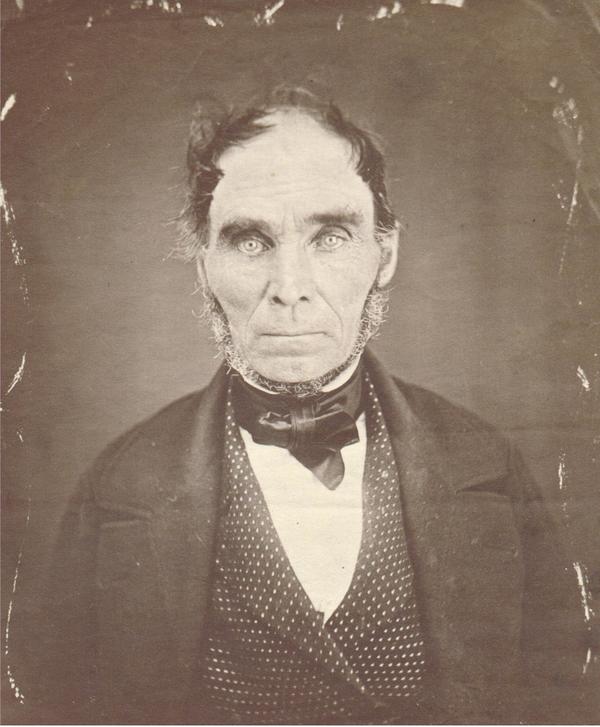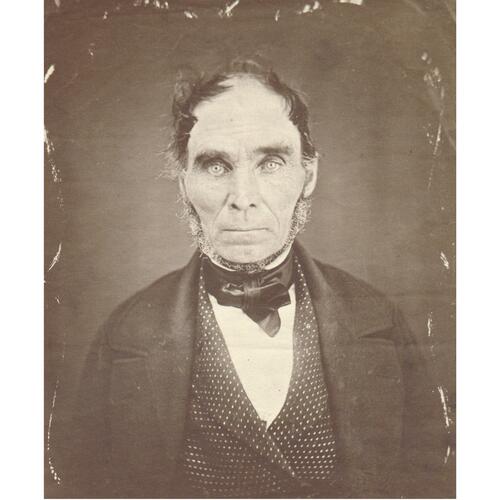
Source: Link
COLBY, MOSES FRENCH, physician and politician; b. 2 July 1795 in Thornton, N.H., younger son of Samuel Colby and Ruth French; m. 10 July 1826 Lemira Strong, and they had two sons and one daughter who lived to adulthood; d. 4 May 1863 in Stanstead Plain, Canada East.
Samuel Colby moved his family to Derby, Vt, in 1798, and they were among the pioneers in that settlement. At the age of 19, Moses French began the study of medicine with the local doctor in Derby. He left to attend medical lectures at Yale College in New Haven, Conn., in 1817 and graduated from Dartmouth College in Hanover, N.H., in 1821. He then began to practise in Derby. Although a boundary line separated Derby from Stanstead, Lower Canada, the people of both shared social interests, and he was named an officer in the newly formed chapter of the Stanstead Masonic Golden Rule Lodge. In 1828 Colby entered the School of Practical Anatomy at Harvard College. There he made the acquaintance of Dr Augustus Addison Gould, president of the Massachusetts Medical Society, with whom he long sustained an interesting correspondence, some of which was published. He returned to his practice in Derby with an ma.
In 1832, after passing a rigid examination before the Quebec Medical Board, Dr Colby moved to Stanstead, whose two physicians had died. His outstanding professional work and continued studies soon placed him at the head of his profession in the Eastern Townships and in northern New England. He published a pamphlet, New views of the functions of the digestive tube in 1860 and contributed valuable articles to the Boston Medical and Surgical Journal and other periodicals. He also offered his own remedies for sale: newspapers advertised “Dr. M. F. Colby’s anti-costive tonic and pills, a Canadian Remedy,” in the 1860s.
Colby was also public-spirited. In January 1837 the Conservative families of Stanstead had prevailed upon him to seek election to the assembly after the resignation of John Grannis, one of two members for Stanstead; the other was Marcus Child*, who supported the Patriote party. The Missiskoui Standard, a Conservative newspaper founded in 1835 by James Moir Ferres, endorsed Colby as a man of high principles. Colby agreed with the views expressed by Conservatives in Stanstead who, although they were opposed to some of the Legislative Council’s policies, did not favour an elective council, which they felt would put too much power into the hands of French Canadians. Neither did he think that the way to improve the government was through revolution. Dr Colby served in the assembly from 13 Jan. 1837 to 27 March 1838, when it was replaced by the Special Council. In 1839 Colby was sued by Robert Nelson*, the former Patriote, allegedly because of an operation performed in 1833 in Vermont. Nelson appears, however, to have been retaliating for Colby’s refusal to support him during the rebellion.
In the first election after the union of the two Canadas in 1841 Moses Colby and Reformer Marcus Child contested Stanstead County. Colby declared himself “an advocate for the free and unfettered exercise of the elective franchise, for a system of responsible government that would secure the country against fraud and malversations of office,” and for taxation only with the consent of the people legitimately expressed through their representatives. He was, however, defeated by Child.
In 1847 Colby was appointed surgeon in the Stanstead Regiment of militia. Another indication of his wide interests appeared in the Stanstead Journal’s comment in September 1848 on his fine Ayrshire cattle shown at the Stanstead County fair at Barnston. For a number of years before his death in 1863 Colby was in feeble health, prematurely worn out by overwork in a day when good physicians were few. He had had a sincere concern for his patients and was regarded as an able, inquiring, and forceful man and doctor. His eldest son, Charles Carroll, represented Stanstead in the House of Commons from confederation to 1891.
M. F. Colby, New views of the functions of the digestive tube by M. F. Colby, M.D., of Stanstead, C.E. (Rock Island, Que., 1860). BCHS Arch., W. F. Beattie, “The times of Marcus Child.” PAC, MG 30, D62, 8, pp.632–36. Private archives, C. C. Colby (Sabinel Island, Fla.), Colby family papers. Missiskoui Standard (Frelighsburg, Que.), January 1837. Stanstead Journal (Rock Island, Que.), 28 Dec. 1854; 12 April, 22 Nov. 1860; 8 Jan. 1863. Vindicator and Canadian Advertiser (Montreal), 7 Jan. 1837. Cyclopædia of Canadian biog. (Rose, 1886), 564. B. F. Hubbard, Forests and clearings; the history of Stanstead County, province of Quebec, with sketches of more than five hundred families, ed. John Lawrence (2nd ed., Montreal, 1963), 151–53. Stanstead County Historical Society centennial journal (2v., n.p., 1965–67), II.
Cite This Article
Marion L. Phelps, “COLBY, MOSES FRENCH,” in Dictionary of Canadian Biography, vol. 9, University of Toronto/Université Laval, 2003–, accessed April 4, 2025, https://www.biographi.ca/en/bio/colby_moses_french_9E.html.
The citation above shows the format for footnotes and endnotes according to the Chicago manual of style (16th edition). Information to be used in other citation formats:
| Permalink: | https://www.biographi.ca/en/bio/colby_moses_french_9E.html |
| Author of Article: | Marion L. Phelps |
| Title of Article: | COLBY, MOSES FRENCH |
| Publication Name: | Dictionary of Canadian Biography, vol. 9 |
| Publisher: | University of Toronto/Université Laval |
| Year of revision: | 1976 |
| Access Date: | April 4, 2025 |



